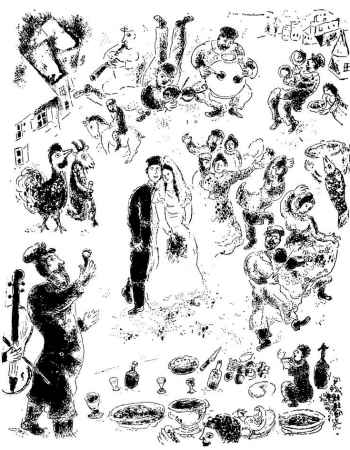Figures

|
|
[Cols. 441-442]

[Cols. 443-444]
|
Shimon Kants The people of Sventzian did not write the life stories or biographies of famous Torah scholars and well-known pious rabbis in their burning desire to immortalize the close figures of their town. These are no more than brief life sketches of simple Jews, sincere and honest, whose virtues and comportment were like pieces of heaven on Sventzian land, and that is why they etched themselves so deeply in the memories of the surviving Sventsyaner Jews. They were sharp minded Torah scholars and G-d-fearing religious people, modest mothers and grandmothers. Lively merchants and artisans, old-time musicians and young workers, who sang of spring, of love, and in their Internationale[1] one could hear the weeping of kol-nidre and the longing of the “Bney Heykhala.”[2] Today, their whole lives would be considered no more than a tale that disappeared. But the yearning for beauty that they carried within themselves and left as a legacy for the survivors will never be silenced. And every indication [is important], even if it is no more than dry dates and [descriptions] of ordinary events recounted in quiet words issued from choking throats hidden deep in a living spring. This is the spring from which the surviving Jews of Sventzian draw their special individuality and the full rivers of longing for Jewish and ever-lasting human beauty. Just as we use wood to feed a fire, the Jews of Sventzian, now scattered to all corners of the world, use the memory of these extinguished and murdered figures to feed the burning fire in their hearts. The beauty of these figures, who are described here, did not derive from gold or silver, not from steel and iron, but from the deep humanity, from warm human actions, [that serve as] examples for future generations. |
Menke Katz
Translated by Janie Respitz
|
And the suffering––– The children were taken from Badan And Sventzian Carried away on lost roads; Alone during nights filled with terror She hears Each of her children – hungry wolves roaring. She hugs Yosinke in his sleep And speaks of sick dreams: Oy, who shall I, who shall I lament first? The children of Badan wandered, On separate roads – lost roads, During starry nights and dark nights. The children of Badan wandered––– Among echoes of shooting, Among far away cries of wounded soldiers. Each one searching for lost luck: Bread, bread, B–R–E–A–D!! |
Hirshe – Leyb Tarshish
Translated by Janie Respitz
|
Mentke packed the wagon with cushions And fastened himself as a horse, With Blumke by his side – for prosperity, He led her by her thin hand.
Through hidden paths, through crowing fields,
Mentke thought,
The evening accompanied them –
A Jew hung from his Tefilin on a tree
Blumke moaned with all her limbs
Hirshe Leyb Tarshish on the tree, Menke Katz |
[Col. 459-460]
|
Mentke caressed the hanging toes And kissed the damaged Tefilin; Hirshe Leyb Tarshish, Hirshe Leyb Tarshish, Who will now, during the month of Elul, Would fight the first cold winds And intoxicate his thin body ––– With prayers and tasty wine. –––Who will now understand as you do, The confessions of the dying that are humming ––– end of summer flies; When the mossy houses in the Shul court yard Shine in the gold of autumn.
––Hirshe Leyb Tarshish, Hirshe Leyb Tarshish,
The hanging tree, |
Hirshe – Leyb Tarshish
Translated by Janie Respitz
|
For whom––– Does the July night get dressed up, Who can still enjoy her haunting beauty––– If not Mentke and Blumke, Who are now coming From the nearby hill And see ––– now not in a dream, The starry rooftops of Sventzian.
Around the mountain – juicy sorrel is blooming.
In the Shul court yard. –the empty shambles, |
Menke Katz
Translated by Janie Respitz
|
Eltzik stated Am I the only one from the entire human race that remained? Did the whole world die And I alone was fated– To live for the sins of all generations? And maybe, They already brought me to my burial place And I am dreaming – the world is a grave? He wanders– He tries to pull at a limb In order to ask himself, if he is alive– A red stream freshens his dusty skin. He shouts over the shouting wind, As if suddenly every stone attacks him: I'm alive–––I'm alive–––––I'm alive! And as if with a stranger's voice, These familiar words resound: Mama, Berke, Mentke, Blumke, Yoske, And Dvoyreke? She shines with a frightened smile: Oy, Elinke, Eltzik, Eltzik, For you – The blue little flowers in my blond braids; For you– The raw scent of my 15th of April.
Eltzik– |
|
|
JewishGen, Inc. makes no representations regarding the accuracy of
the translation. The reader may wish to refer to the original material
for verification.
JewishGen is not responsible for inaccuracies or omissions in the original work and cannot rewrite or edit the text to correct inaccuracies and/or omissions.
Our mission is to produce a translation of the original work and we cannot verify the accuracy of statements or alter facts cited.
 Svencionys, Lithuania
Svencionys, Lithuania
 Yizkor Book Project
Yizkor Book Project
 JewishGen Home Page
JewishGen Home Page
Copyright © 1999-2026 by JewishGen, Inc.
Updated 26 Oct 2019 by LA